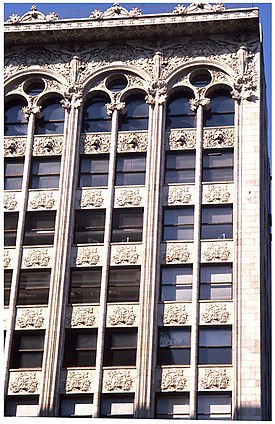Bayard-Condict Building
|
Bayard–Condict Building
|
|

(detail)
|
|
| Location | 65 Bleecker Street Manhattan, New York City |
|---|---|
| Coordinates | 40°43′35″N 73°59′42″W / 40.72639°N 73.99500°WCoordinates: 40°43′35″N 73°59′42″W / 40.72639°N 73.99500°W |
| Built | 1899 |
| Architect | Louis Sullivan |
| Architectural style | Chicago School |
| NRHP Reference # | 76001236 |
| Significant dates | |
| Added to NRHP | December 8, 1976 |
| Designated NHL | December 8, 1976 |
| Designated NYCL | November 25, 1975 |
The Bayard–Condict Building at 65 Bleecker Street between Broadway and Lafayette Street, at the head of Crosby Street in the NoHo neighbourhood of Manhattan, New York City is the only work of architect Louis Sullivan in New York City. It was built between 1897 and 1899 in the Chicago School style; the associate architect was Lyndon P. Smith. The building was originally known as the Condict Building before being renamed the Bayard Building. The building was considered to be a radical design for its time, since it contravened the strictures of American Renaissance architecture which were the accepted status quo, but had little influence on architectural design in New York City, because of its location in the industrial area that Bleecker Street was during that period. It is located in the NoHo Historic District.
The building was designated a New York City landmark in 1975, and has been a National Historic Landmark since 1976.,
This commercial office building is clad in white terra cotta over a masonry wall. The Bayard Building was one of the first steel skeleton frame skyscrapers in New York City and the Department of Buildings raised numerous objections to the design before the plans were finally accepted. It is one of the first examples of the Chicago school style of architecture in New York City.
...
Wikipedia



